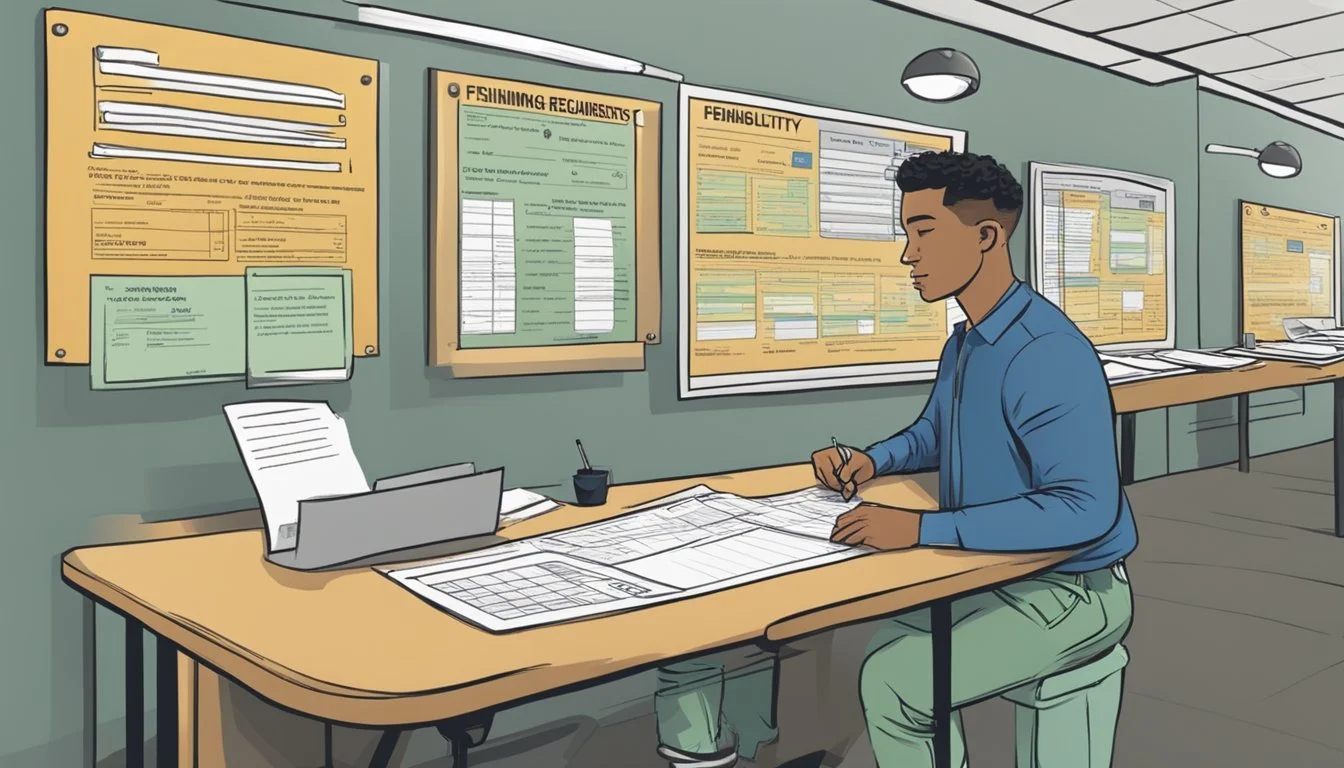How to Get a New York Freshwater Fishing License
A Step-by-Step Guide
Anglers in New York State have access to a diverse range of freshwater fishing opportunities, with over 7,500 lakes and ponds and roughly 70,000 miles of rivers and streams that provide a habitat for a myriad of fish (What wine goes well with fish?) species. Whether one is a seasoned fisherman or a beginner eager to cast their first line, obtaining a fishing license is an essential step that contributes to conservation efforts and ensures the longevity of the state's aquatic resources.
Residents and visitors over the age of 15 must obtain a fishing license to fish in New York's freshwater bodies. Licenses are readily available and can be acquired through multiple channels to suit individuals' preferences. These include visiting an official License Issuing Agent in person, ordering by phone, or using a convenient online service provided by the state.
Securing a fishing license is not only a legal requirement but also an investment into maintaining the natural beauty and health of New York's waterways. The funds generated from license fees support fishery management, habitat protection, and environmental education programs. With a valid license in hand, anglers are free to enjoy the rich fishing experiences that New York has to offer while contributing to the stewardship of its natural aquatic environments.
Eligibility and Requirements
Obtaining a freshwater fishing license in New York requires individuals to meet specific residency and age criteria, along with considerations for special groups such as seniors, veterans, and those with disabilities.
Residency Qualifications
Resident: A person is deemed a resident if they have lived in New York State continuously for 30 days before applying for the license. Proof of residency can be established through a state-issued ID or driver's license.
Non-Resident: Individuals not meeting the residency requirement are regarded as non-residents and must obtain a non-resident fishing license.
Age Requirements
General Age Rule: Anyone aged 16 or older is required to possess a fishing license to fish for freshwater species.
Senior Citizens: New York State residents who are 70 years or older are eligible for reduced-fee licenses.
Special Provisions
Military Veterans and Active Duty Military: Reduced-fee licenses are available to resident active duty military members and military veterans possessing a letter from the U.S. Veterans Administration stating they are at least 40% disabled.
Legally Blind: Individuals who are legally blind can apply for a free fishing license.
Native Americans: Members of the Shinnecock and Poospatuck tribes, or member of the Six Nations residing on reservations in New York State, do not require a license to fish.
Non-Resident Students: Full-time students attending a New York State college or university are eligible for resident fishing license fees.
Disabilities: There are special privileges and applications for people with qualifying disabilities who wish to fish in New York State waters.
Types of Fishing Licenses
In New York, several specific types of fishing licenses cater to different needs and time frames, including annual, short-term, lifetime, and specialty licenses.
Annual Licenses
Annual fishing licenses are valid for one year from the date of purchase and can be bought regardless of residency status. They allow the holder to fish in freshwater bodies across New York State.
Short-Term Licenses
For those planning a brief fishing trip or who don't fish often, there are short-term licenses available. New York offers a:
7-day fishing license for short-term recreational fishing.
1-day fishing option for an even shorter duration, attractive for casual or tourist anglers.
Lifetime Licenses
For avid fishers, New York has lifetime fishing licenses which negate the need to renew annually. These licenses remain valid even if the holder moves out of state.
Specialty Licenses
The state also offers specialty licenses such as the:
Farm Fish Pond License, for owners of registered farm fish ponds.
A license is not required for fishing in a licensed fishing preserve.
Additionally, a Marine Fishing Registration is needed for fishing migratory fish of the sea and saltwater fish species. This is separate from a freshwater fishing license and is often referred to as the Recreational Marine Fishing Registry.
How to Purchase a License
Purchasing a New York freshwater fishing license is a straightforward process with various methods available for convenience. One can acquire this permit online, by phone, via mail, or in person, depending on preference and accessibility.
Online
To buy a fishing license online, individuals can visit New York's official DEC website or a trusted online licensing system. The process is typically quick and user-friendly, offering various license types to suit different fishing needs.
Phone
Those preferring to purchase their fishing license over the phone can do so by calling the DEC's automated licensing system. This service usually requires a major credit card for payment.
By Mail
Prospective anglers can also opt to send an application for a fishing license through the mail. This method involves completing the necessary forms and mailing them, along with payment, to the New York State Department of Environmental Conservation.
In-Person
Purchasing a license in person is possible at any official License Issuing Agent location. These include many sporting goods stores, tackle shops, and various retail outlets. On Reservation Land, licenses may be available at specific outlets designated by Native American tribes.
Fishing Regulations
New York State provides a comprehensive set of fishing regulations designed to manage freshwater fisheries and to ensure that angling remains a sustainable and responsible activity. These regulations encompass seasonal guidelines, acceptable fishing methods, and specific rules for various water bodies and species.
Freshwater Species Regulations
New York State's fishing regulations outline specific catch limits and size requirements tailored to various freshwater fish species. For instance:
Trout: Size and catch limits vary by waterbody and time of year.
Bass: Both largemouth and smallmouth bass have specific open seasons and minimum size requirements.
Panfish: Includes species such as bluegill and sunfish, generally with more lenient regulations.
Anglers should reference the New York Freshwater Fishing Regulations Guide for a detailed list of species-specific rules.
Fishing Method Restrictions
Certain methods of taking fish are regulated in New York. The allowable methods include:
Angling: Using a line and hook, which is the standard fishing method.
Spearing: Permitted for certain species in designated waters.
Longbow: Allowed for carp in some areas, but fishermen should check local regulations.
Tip-Ups: Ice fishing with a tip-up device is permitted, subject to specific regulations regarding the number and placement.
Baitfish usage is also regulated to prevent the spread of invasive species. The category of baitfish includes minnows, leeches, and other small prey.
Protected Areas
Some locations within New York have special protections to preserve local ecosystems or cultural significance. This includes:
Licensed Fishing Preserve: Fishing might be regulated differently from state laws, with specific focus on ensuring the sustainability of the fish population.
Reservation Land: Certain Native American reservation areas may have unique fishing regulations which must be respected.
Habitats of Special Concern: Areas that are crucial for the breeding or survival of particular freshwater fish or frog species may have tighter regulations or may be closed to fishing during sensitive times.
In all protected areas, it is crucial for anglers to understand and comply with the specific regulations in place to protect these environments and their inhabitants.
Where to Fish
New York State offers a diverse range of freshwater fishing opportunities. Anglers looking to fish in New York can find an array of fishable waters, ranging from lakes and ponds to rivers and streams, with each providing unique environments for various freshwater fish species.
Lakes and Ponds
Lakes Ontario and Erie: Renowned Great Lakes offering opportunities to catch species like smallmouth bass, walleye, and lake trout. Both lakes are subject to specific fishing regulations to preserve the fishery.
Lake Ontario is known for its large salmon and trout.
Lake Erie is highly regarded for its walleye and smallmouth bass fishing.
Other Notable Lakes:
Lake Champlain: Shares a border with Vermont and provides excellent fishing for bass, pike, and panfish.
Greenwood Lake: Offers a variety of fish, including bass and crappie.
Indian Lake: A popular spot in the Adirondack region with a healthy fish population.
Rivers and Streams
Hudson and Delaware Rivers: These waterways are teeming with fish throughout the year and have areas that are ideal for both fly fishing and conventional tackle.
Hudson River: Known for striped bass during their annual spring run.
West Branch Delaware River: Offers some of the best fly-fishing for trout in the state.
Other Important Rivers:
St. Lawrence River: Famous for muskellunge and smallmouth bass fishing.
Niagara River: Provides unique fishing opportunities with strong currents and access to steelhead, lake trout, and walleye.
Border Waters
Shared Waters on State Borders: These areas are managed cooperatively with neighboring jurisdictions and follow specific fishing regulations to ensure sustainability.
Erie (Pennsylvania border): Recognized for perch and bass fishing.
Ontario (Canadian border): Renowned for salmon and trout, particularly in the tributaries.
Champlain (Vermont border): Known for pike, bass, and perch fishing opportunities.
St. Lawrence (Canadian border): Offers world-class fishing for muskie and bass.
Niagara (Canadian border): Accessible for various migratory species depending on the season.
Careful adherence to fishing regulations is crucial for the health of New York's freshwater fisheries. Different bodies of water may have distinct rules regarding seasons, catch limits, and allowed methods of fishing, ensuring that the practice remains sustainable and enjoyable for generations to come.
Special Events and Programs
New York State offers special events and programs designed to encourage fishing and educate residents. These include periods when no fishing license is required and times where expert instruction in fishing is provided at no cost.
Free Fishing Days
New York State designates Free Fishing Days each year to allow individuals the opportunity to fish without a license. On these days, anglers may catch freshwater fish across the state's waters with the waived requirement of a fishing license. Free Fishing Days aim to provide both residents and visitors with the chance to experience fishing, promote awareness of the state's aquatic resources, and foster interest in fishing as a recreational activity.
Scheduled Free Fishing Days:
June: National Fishing and Boating Week
September: National Hunting and Fishing Day
November: Veterans Day
Fishing Clinics
Fishing Clinics are official events authorized by the New York State Department of Environmental Conservation (DEC). These clinics are established to introduce individuals to fishing and to provide education on environmental conservation. During a Free Fishing Clinic, participants are exempt from the license requirement, enabling them to partake in fishing and learn various techniques and ethics related to the sport.
Highlights of Fishing Clinics:
Instruction on fish identification, fishing equipment use, and techniques.
Understanding of fisheries management and aquatic ecology.
Clinics are often supported by local fishing clubs and environmental organizations.
Cost of Licenses
The cost of a New York freshwater fishing license varies based on factors such as residency status, license duration, and age. Residents can benefit from reduced fees compared to nonresidents, and the option for lifetime licenses adds an additional layer of flexibility for avid anglers.
Resident Fees
Annual Fishing License: A standard fee for a resident annual freshwater fishing license is $25.
Lifetime Licenses: Residents have the unique opportunity to purchase a Lifetime Fishing License which allows them to fish for life without the need to renew annually.
Nonresident Fees
Annual Fishing License: Nonresidents are required to pay a higher fee for an annual fishing license. While specific costs can vary, it is generally higher than the resident fee to account for nonresident status.
Lifetime Licenses: Nonresident anglers do not have the option for a lifetime fishing license and must renew their permits on an annual or shorter-term basis, depending on their needs and the length of stay.







